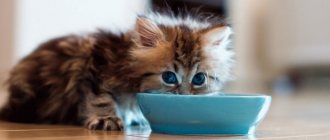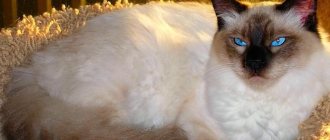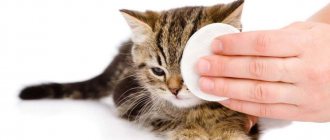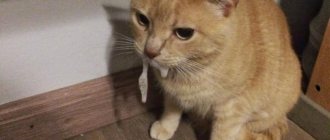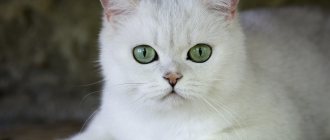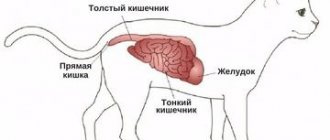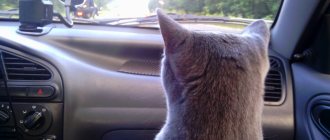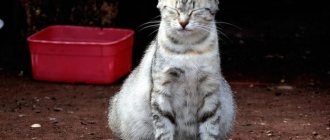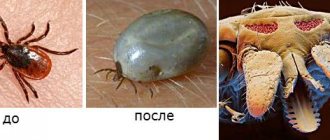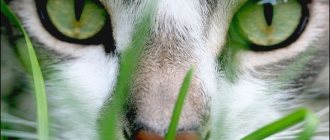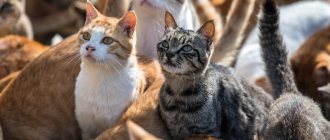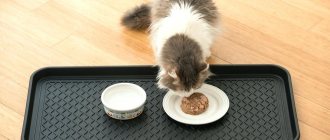18637Pavel
4
Sometimes cat owners notice that their pet begins to feel sick after eating both commercial and natural food. There are many reasons why a cat vomits after eating undigested food. And the most harmless one is overeating. Murka could simply overeat and in this way empty her stomach. Vomiting of pieces of unprocessed food can also occur if the animal has been starving for a long time. The stomach may simply not be ready to receive a significant amount of food.
But a cat’s vomiting after eating can also occur for more serious reasons. For example, a pet vomits pieces of food in the presence of chronic gastrointestinal pathology.
In any case, if a cat burps after eating for no apparent reason, then he needs a full medical examination. The veterinarian will be able to determine why the animal is vomiting after eating, and also prescribe treatment appropriate to the current condition.
© shutterstock
What is indigestion in a cat?
From a medical point of view, the term “indigestion” does not only mean diarrhea. Upset or indigestion, also known as dyspepsia, is a violation of its basic functions, namely:
- movement of food through the gastrointestinal tract;
- secretion of gastric juice and enzymes;
- normal digestion of food.
At the same time, under the influence of unfavorable factors (high or low temperature, toxins, general intoxication, consumption of salty and spicy foods, etc.), the production of gastric juice and enzymes by the secretory glands is reduced.
Food stops being digested normally and stagnates in the stomach. Fermentation processes occur, leading to bloating of the stomach and overflowing with gases. All this is accompanied by a decrease in organ motility, which is sometimes accompanied by pylorospasm, which significantly complicates the movement of food through the gastrointestinal tract, causing pain, nausea and vomiting.
If poorly processed food mass enters the small intestine, then fermentation processes also occur there. This leads to intestinal bloating, increased peristalsis and diarrhea.
If a cat has an upset stomach, treatment should be prescribed as early as possible, because this problem affects the functioning of the entire body and can lead to dire consequences.
Causes of indigestion
No matter how diverse the factors that disrupt the normal functioning of the stomach, I would like to separately note that an animal that eats properly and regularly, undergoes vaccination and deworming on time, and lives with loving owners, has minimal chances of developing dyspepsia.
The following factors can contribute to indigestion in a cat:
- sudden change in diet;
- irregular meals;
- low-quality food (cheap or expired food, food from the table);
- use of certain medications (non-steroidal anti-inflammatory drugs, some antibiotics);
- stress;
- infectious diseases (for example, panleukopenia);
- parasitic diseases (helminths and protozoa);
- systemic pathologies (including renal and liver failure);
- neoplasms of the digestive tract;
- changes in the functioning of the pancreas, liver and gallbladder;
- inflammation of the intestinal tract;
- foreign bodies in the stomach.
Types of vomit
If a cat vomits, then under no circumstances should you scold it. To determine the cause, you should carefully examine the vomit. They are of the following types:
Binge eating
- Vomiting of undigested food. It happens if the pet was overfed, or he ate too quickly, greedily swallowing large pieces of food. An isolated case does not pose a threat to the health of the animal. However, if a cat constantly vomits after eating undigested food, then the pet should be shown to a doctor. Perhaps the cat has stomach problems, the functioning of the pancreas is impaired, etc.
- Vomiting blood in a cat , the cause of which is bleeding in the gastrointestinal tract caused by an ulcer or neoplasm. In this case, contacting a veterinarian cannot be delayed.
- The vomit is yellow. A cat burps yellow liquid when bile enters the stomach, disrupting digestion and liver function.
- Vomiting white foam. If a cat vomits white foam (usually in the morning and on an empty stomach) several times in a row, then there is a reason to go to the veterinary clinic. The causes of vomiting may be:
- inflammatory processes in the gastrointestinal tract;
- helminth infection;
- poisoning with poor quality or stale food;
- infectious diseases.
- Vomiting water. The reasons why a cat is vomiting water can be:
Hygiene procedures
- the need to remove hairballs from the stomach (before getting rid of the accumulated hair, the cat makes “coughing” sounds, then it vomits gastric juice, which looks like water);
- problems with the thyroid gland;
- poisoning (chocolate, caffeine and other products that the cat is not able to digest normally).
Main symptoms of stomach dyspepsia
Symptoms of dyspepsia may vary somewhat depending on the development of the process. The main features include:
- Fast saturation with food. The cat begins to eat little, up to a complete refusal of food.
- Vomit. If you have an upset stomach, regurgitation occurs within half an hour after eating.
- Diarrhea is quite common with dyspepsia, and the stool becomes frequent, loose, and may contain mucus or have a greenish tint.
- Constipation is less common if intestinal motility is impaired.
- Abdominal bloating can be detected by palpation, and the animal appears restless.
- Lethargy. If your cat is not feeling well, it will not be as energetic as usual.
Dehydration and its elimination
If your cat develops vomiting/diarrhea (or both), the main problem will not be lack of appetite, but dehydration, which is especially dangerous for kittens and young animals. To check whether your pet has developed it, simply pinch its skin and see how long it takes for the resulting fold to straighten out. If there is no dehydration, the skin will almost instantly return to its original state, while otherwise this process will take a decent amount of time. In this case, the animal is most likely close to a critical condition that needs to be stopped as soon as possible.
Stomach upset in a kitten
The kitten’s digestive tract is not yet fully formed, which is why it is especially susceptible to damaging factors.
Most often, stomach upset in kittens occurs in the following cases:
- When artificially feeding, if the milk formula is poorly selected.
- With a sharp transition from mother's milk to an adult diet.
- When changing the diet after separation from the mother (when the kitten ends up with other owners).
If the baby is unable to suckle from his mother's breast milk, he should receive a specialized formula for cats. Feeding cow's milk, goat's milk, or infant formula can cause severe indigestion in a kitten. Cats produce less lactose than other animals, so excess milk sugar cannot be absorbed by the body, causing fermentation in the gastrointestinal tract.
In rare cases, dyspepsia develops in newborn kittens with abnormal enzyme production. In this case, only feeding with a special lactose-free formula for kittens helps.
The transition to an adult diet should be gradual. In case of abrupt weaning from the mother, if the kitten has not yet completely switched to adult food, part of the diet should be replaced with a specialized milk formula.
It is also important to ensure that after a change of owners, the kitten receives the same nutrition for the first time. The transition to other types of food should be smooth, with gradual replacement with new food over 1–2 weeks.
Probable Causes
The reasons why a cat vomits after eating may be as follows::
- poor quality diet;
- feed intolerance;
- binge eating;
- deviations in the operation of internal systems.
Incorrectly composed diet
The reason why a cat vomits after eating may be its diet. The animal must receive high-quality protein that provides it with a feeling of full saturation. Otherwise, the pet can simply get rid of low-quality food, cleansing the stomach in the most physiological way: it simply vomits.
To avoid the development of vomiting attacks caused by bad food, you need to be extremely careful when preparing your fluffy’s diet. It is best to buy premium or super-premium food, since they contain all the necessary substances and microelements. And, very importantly, they are made from real meat.
Budget food contains no more than 2–3% natural meat. The remaining mass is represented by by-products that represent virtually no biological value - skin, feathers, veins, heads and beaks.
The animal’s body may refuse to accept such food and respond to it with a gag reflex.
© shutterstock
When purchasing food, you need to study its composition. If it contains preservatives, dyes, propylene glycol and ethoxyquin, then you should avoid purchasing it. It will not give anything useful to the pet.
Feed intolerance
Sometimes a cat vomits after eating undigested food due to its body’s inability to accept certain foods. For example, your pet may be lactose intolerant. And then after consuming whole cow's milk, he also vomits.
Most often, nausea develops when feeding an animal natural food. If the diagnosis confirms this, then it makes sense to transfer the pet to specialized dry food that completely excludes possible allergens and controversial components.
Overeating and eating food too quickly
A cat sometimes vomits from overeating and the reason for this is the special structure of the esophagus. It is located horizontally. With a rapid intake of food or its significant volumes, the animal’s body can block the sphincter that opens the entrance to the stomach. In this case, the cat is forced to get rid of excess food by regurgitating it. As a rule, he vomits some time after eating.
Most often, such vomiting attacks develop in animals if several pets live in the same area . Competition for food forces the murka to eat as much food as possible during one feeding. The problem can be solved simply: it is enough for each cat to have its own bowl or to feed the cats in different rooms.
Treatment for indigestion in cats
The condition, which manifests itself symptomatically as indigestion, can occur with many other life-threatening pathologies.
Repeated vomiting, lethargy of the animal, or constipation or diarrhea are reasons to contact the clinic as soon as possible. If indigestion is caused by any general medical condition, treatment will be aimed at eliminating the root cause. If tests and examinations do not show pathologies of other organs or infections, then symptomatic therapy is carried out, which includes the following main points with various variations:
- starvation diet for 24 hours;
- injections of antiemetic drugs;
- oral administration of sorbents;
- in case of dehydration - infusion therapy.
After the condition has stabilized, the doctor usually prescribes a therapeutic diet, small meals, probiotics, and also explains to the owner the basics of proper feeding.
Quick help and properly prescribed treatment for indigestion in cats can avoid many health problems. The main prevention of this unpleasant phenomenon is only proper nutrition of the pet.
How to treat stomach upset in cats at home
Of course, the optimal solution is a visit to the clinic, but there are situations when the owner does not have such an opportunity. What to do if a cat or an older kitten has an upset stomach, for example, at your dacha? How can you help your pet at home?
Diet and drink
Don't try to tempt your cat with tasty food in hopes that he will eat. You should only leave a bowl of clean drinking water.
If you experience repeated vomiting and diarrhea, you should be wary of dehydration. In this case, it is best to drink special solutions, such as Regidron, which are sold in a regular pharmacy.
The contents of 1 sachet should be diluted in 1 liter of water and given to the animal as often as possible from a syringe without a needle, 5-10 ml.
Sorbents
Sorbents, which can most often be found in a home medicine cabinet, will help reduce fermentation processes, soothe irritated gastric mucosa, neutralize toxins and normalize stool.
It is best to use Smecta. 1 sachet is diluted in 100 ml of water and drunk in small portions throughout the day: 5–10 ml for an adult cat, 1–2 ml for a kitten 4–5 times a day. You can also take Enterosgel, first diluting it with water to a liquid consistency.
Probiotics
When the animal gets better, you should start giving it food in small portions, but not earlier than a day after the symptoms appear. It is useful to drink probiotics, such as the veterinary drug Vetom 1.1 (dose for an adult cat - 1/10 of a sachet) or another probiotic for animals.
If no veterinary drugs are available, human drugs can be used. The easiest way to dose liquid probiotics, for example, the dose of Hilak Forte for an adult cat is 3-5 drops 3 times a day.
These measures can also be used as first aid if you feel unwell, even when a further visit to the clinic is planned.
Basic information
Vomiting and stomach upset can occur for a variety of reasons. In some cases, they are noticed only once, after which the animal’s gastrointestinal tract returns to normal, in others, there is a repeated effect on the digestive system, which is why the cat has cases of diarrhea all the time. As a rule, indigestion is not a fatal pathology; most often it is explained by stale or unsuitable food for the animal.
Thus, digestive disorders often occur when a cat switches to a new brand of cat food. Sometimes there are pets who eat quickly and greedily: this behavior also contributes to disruption of normal food absorption. An upset stomach can be caused by numerous hairballs, which is especially true for long-haired cats. In cases where diarrhea occurs rarely, from time to time, it makes sense to pay attention to the following possible causes:
- Sudden change in diet , including the brand of food used (even if from the same manufacturer). By the way, an adult cat may well have a disorder from milk.
- Hairballs in the stomach.
- Eating fish or chicken bones. However, in this case, indigestion is the least of all problems, since in the worst case scenario, gastric perforation and death from peritonitis are quite possible (feces often contain blood).
- Side effects from some medications (read the instructions).
- Eating spoiled food (a very common cause). It is generally accepted that cats are “delicate” creatures, and therefore they will not eat “overdue food” even on pain of starvation. This is far from true - even a not too hungry cat may well consume something “smelly” and then suffer from diarrhea.
- Pancreatitis or other disease of the endocrine glands.
- Parasites (may be indicated by diarrhea with mucus).
- Viral or bacterial infections.
When to go to the clinic
If within 24 hours the animal does not get better, and in addition to the described signs, any other symptoms appear (discharge from the eyes and nose, staining of vomit and feces black, vomiting bile, yellowness of the mucous membranes), then medical help cannot be avoided. .
Lack of timely diagnosis can lead to the development of other dangerous diseases, which are often the root cause of dyspepsia. If the symptoms quickly subside and the pet returns to its previous activity, then most likely the problem was minor, but repeated vomiting and diarrhea quickly lead to dehydration, threatening the animal's life.
